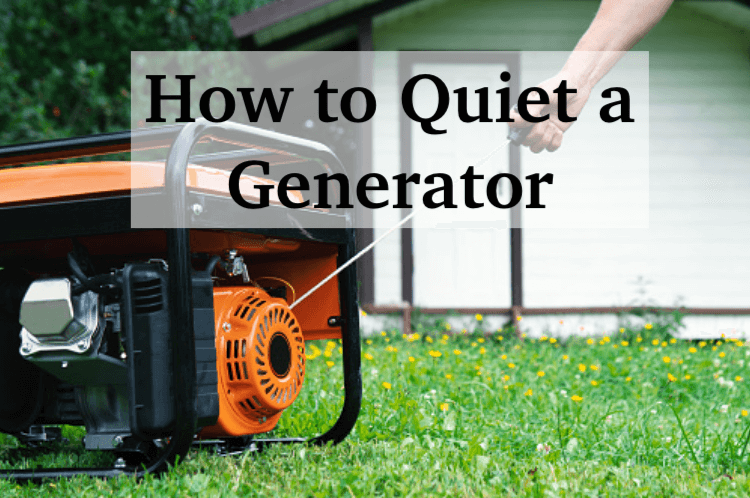
Generators are perfect for powering your devices, keeping the lights on, and providing the power for entertainment such as stereos and televisions while camping. Unfortunately, they have an imperfection: they’re super loud!
Here are tips you can use to quiet a generator:
- Buy a suitable generator
- Face the exhaust away from you
- Put rubber feet on your generator
- Put your generator on a soft surface
- Put your generator in a sound-absorbing box
- Use sound deflectors around your generator
- Replace the muffler or install a secondary one
- Use a bucket of water
- Use a soundproof blanket
- Keep your generator as far away as possible
I’ve done some research so I can explain these tips to you below. I also have some suggestions for alternatives you can try out if a generator isn’t for you.
- #1. Buy A Suitable Generator
- #2. Face The Exhaust Away From You
- #3. Put Rubber Feet On Your Generator
- #4. Put Your Generator On A Soft Surface
- #5. Put Your Generator In A Sound-Absorbing Box
- #6. Use Sound Deflectors Around Your Generator
- #7. Replace The Muffler or Install A Secondary One
- #8. Use A Bucket Of Water
- #9. Use A Soundproof Blanket
- #10. Keep Your Generator As Far Away As Possible
- How Do I Know if My Generator Is Overheating?
- Alternatives To Using a Generator
- Conclusion- How to Quiet a Generator In 10 Ways
#1. Buy A Suitable Generator
Finding a generator quiet enough for camping can be tough, so make sure you’re searching for one that’s been designed to be as quiet as possible.
The average generator’s sound output is around 60–70 decibels when it’s 7 meters or 23 feet away from you. On a scale of loudness, this would sit somewhere between a dishwasher and a vacuum cleaner.
If you think about how a vacuum cleaner can easily wake you up in the morning, then it’s no shock that it can be difficult to sleep with a noisy generator like this. You’ll want one quieter than that—ideally, something measuring between 50–60 dB.
Quiet residential streets, offices, and conversations often come in at 50 dB. These are ambient sounds that are easy to sleep through, and you won’t break any noise regulations with them. Whisper-quiet AC units and normal conversations are just under 60 dB.
If you want to take a look at the best camping generators, you’ll find plenty that come in under 60 or just over 50 dB.
Don’t just buy your generator based on volume, though. You’ll want one with a solid build quality, enough power to fuel even your beefiest devices (like a mini-fridge), and great fuel efficiency. Bonus points if it’s light—under 50 pounds is best, as it’s easier to transport light generators.
I recommend the Honda 662220 EU2200i 2200 from that list. It’s a little pricey, but it’s one of the quietest, and it has all the qualities you need in a generator.
#2. Face The Exhaust Away From You
The exhaust pipe creates the most noise, so you won’t want it facing you. Try to face it away from your campsite. Some generators also let you face the exhaust pipes upward.
Having the exhaust facing up or away from you will also direct the noise away from you.
Personally, I say you should try to position the pipe upward, or at least directly into an empty site or patch of nature. You accidentally might end up facing the exhaust pipe into a neighboring campsite, and you don’t want to do that, either.
Forests are excellent at absorbing sound, so face the exhaust towards woodlands if possible.
#3. Put Rubber Feet On Your Generator
Rubber is a fantastic sound-absorbing material, so look for rubber feet. Ideally, you’ll want anti-vibration rubber feet.
Not only will the rubber help absorb some of the generator’s noise, but the anti-vibration aspect will also stop vibrations from creating additional sound.
This is one of the simplest solutions on this list, and it can be paired with many of the others to create as quiet a generator as possible.
If the feet above don’t fit your generator, then shop around online or at your local hardware store. You’re sure to find something suitable, but if you don’t, then the next tip can help instead.
#4. Put Your Generator On A Soft Surface
Putting your generator on a soft surface will also help absorb and muffle some of the noise. Pairing this with rubber feet is great.
Grass is the perfect surface to put your generator on. It’s natural, and there’s probably plenty of it around your campsite. If there isn’t, then don’t worry. There are various soft surfaces you can purchase to use with or without the grass.
An anti-vibration mat is the best thing you could use instead of grass. It’ll prevent vibrations and the noise caused by them.
You could also use a yoga mat, small rug, or a foam sleeping pad. Any spongy or soft surface you have on hand or can think of will suffice. It’s much better than using nothing.
A spare blanket works in an emergency if you have no grass or other soft surfaces around.
#5. Put Your Generator In A Sound-Absorbing Box
A sound-absorbing box will ensure there’s as little noise as possible from your generator on all sides. You may be able to find these sound-absorbing boxes available in some stores, usually called a “baffle box” or “generator quiet box.”
You can easily DIY one, though. Get a crate that’ll fit your generator, attach some sound-absorbing foam to the insides of it, then place your generator in the box. You’ll want this box to have an open side so the vent faces out into the open.
If you’re crafty, you can build an even better one out of thick plywood and sound-absorbing foam. Install a vent for the exhaust, and you can enclose the generator on all sides that way.
Make sure your generator isn’t pressed up against the sides of this box. You don’t want to block off the fan, as that could lead the generator to overheat.
The video below will show you a sound-absorbing box that somebody built. It doesn’t even have foam on the sides, but you can hear the volume difference regardless.
#6. Use Sound Deflectors Around Your Generator
If you can’t find or make a sound-absorbing box, then you could try to create the messy version of one. You’re essentially creating sound deflectors that you surround your generator with.
Anyone can create this—no DIY skills are required. You’ll need to visit a hardware store of some kind to purchase four pieces of plywood, the thicker the better, but that’s the hardest thing you’ll do.
Make sure these pieces of wood are taller and wider than your generator, then place them at an angle with gaps between each piece to allow for airflow.
These pieces of wood will block many of the sound waves from reaching you, and they’ll help deflect the waves into the ground.
That’s why having your generator on a soft surface is essential. It’ll absorb those waves and stop them from bouncing around within the walls you create.
The video below will show you the angle you should aim to place all four of your wood pieces at.
#7. Replace The Muffler or Install A Secondary One
The larger the muffler, the quieter the generator. The muffler is designed to dampen the noise of the motor and exhaust pipes on your generator, so a larger or secondary muffler really makes all the difference.
You won’t always be able to find a suitable secondary muffler, and that’s fine. However, if you can find one, then I recommend it. Any car or motorbike muffler that’s the same size as your generator’s muffler will work.
It should be the same diameter and thickness, and if you have a choice between a motorcycle’s and a car’s muffler, choose the former. They’re generally best at dealing with harsh gases.
If you install a secondary muffler, you’ll need to weld it to your current muffler. Try to angle it upwards if you can, and avoid welding the secondary muffler to the generator’s body.
If you can’t do any of that, no worries. Consult an expert such as a small engine repairman or a specialized mechanic, and they’ll help you find a larger muffler that’ll fit your generator.
In fact, they may be able to help you fit a second muffler, but they won’t always be able to.
Please never attempt to replace or add to your muffler on your own if you’re not an expert already. You can ruin your generator if you don’t know exactly what you’re doing.
This isn’t an easy tip to follow, as your generator will require a customized fit.
#8. Use A Bucket Of Water
Does replacing your muffler seem like too much work? Don’t worry. This tip still requires some know-how and craftiness, but it’s easier than replacing your muffler.
You’ll need a hose, clamp, and 5-gallon bucket to fill with water.
Place your generator on slightly higher ground than your bucket, as this will stop the water from flowing into your exhaust. Then secure the hose to the exhaust pipe using the clamp or other means.
I suggest poking holes in the hose to prevent backflow. You don’t actually need to use the hose as a hose, so it’ll be fine.
Then place the hose in the bucket. When you turn the generator on, the noise will exit the exhaust, enter the hose, go to the bucket, and be filtered through the water before you hear it.
#9. Use A Soundproof Blanket
Generators can be covered to an extent, as long as there’s enough air circulation to prevent them from overheating. If you keep the fan and exhaust free enough for at least some air circulation, then you’ll be fine.
Keeping the sides of the generator freed up for air circulation is a good idea, too. They can get pretty warm when the generator is running.
Get a non-flammable soundproof blanket, and cover your generator as much as possible. Ideally, cut holes for the exhaust and the fan. Then you’ll want to stake the blanket out while it’s on top of the generator, just like you would with a tarp over a tent.
Don’t let the blanket touch the sides of the generator, and ensure the fan and exhaust are positioned near the holes you made in the blanket.
Leave a slight gap between the blanket and the ground, but don’t make it too large. The blanket will then dampen the sound of the generator while deflecting it towards the ground.
#10. Keep Your Generator As Far Away As Possible
Ensuring your generator is as far away as possible will help you a ton at stopping the generator’s noise from bothering you. Your campsite will be delightfully quiet—but will other campsites be quiet?
I recommend trying to place your generator around 23 feet away from your tent and relaxation area, but that’s not always possible. There may be other campers on the site next to yours.
If there are campers next to your site, then try to place your generator midway between your site and theirs. That makes it fair, as you’ll have to deal with the same amount of noise.
It can still be tricky to keep the generator far enough away to make it quieter, though, especially on small sites. If you’re staying on a small site, then consider some of the other tips on this list.
However, if you’re staging at a large site or have no neighbors, the sky’s the limit.
Well, no—the length of your extension cord and how far you’re willing to walk is the limit.
You’ll need a sturdy outdoor extension cord or two if you’re keeping your generator far away from your site. Make sure it’s weatherproof, including frostproof, just in case anything happens.
You can find 100-foot heavy-duty extension cords easily, but it’ll take some digging if you want something longer. Generally, though, keeping your generator 100 feet away is plenty far enough. The noise will barely be noticeable if you keep it at that distance.
Just make sure you’re okay with walking 100 feet to check on the generator. You probably won’t want to if it’s raining, so adjust the distance to suit your needs and wants.
How Do I Know if My Generator Is Overheating?
Generators grow louder when they’re overheating, and they’ll also run their fans excessively to try and cool down. Make sure you check on your generator regularly to ensure it hasn’t become excessively noisy.
Run your generator for a while before you implement your quieting techniques. This will help you get to know what it’s supposed to sound like, and that will help you catch when it’s overheating.
Never fully cover the exhaust or the fan. If you put your generator in a box, make sure there are a few extra inches around the sides. If you cover it with a blanket, don’t let the blanket obscure the fan or exhaust.
It’d be a good idea to keep a fire extinguisher nearby for emergencies, too.
Alternatives To Using a Generator
Generators aren’t the only way to guarantee you have electricity while camping. They’re the most reliable way, of course, but there are a few alternatives to consider if a generator is too loud or too much work for you.
#1. Visit a Powered Campsite
Visiting a powered campsite is a sure way to keep all your devices powered, all day and night.
Powered campsites are great for inexperienced campers, as you’ll easily power all the devices that remind you of the comforts of home. You’ll also be able to charge your RV battery, if applicable, without worrying that your generator won’t be strong enough.
You’ll need to make sure you have an extension cable long enough to reach the electrical outlets, though. Try to get a campsite as close to electrical outlets as possible, and you’re sure to have no issues.
You can eventually experiment with camping with a generator or without any electricity at all, but if you really want electricity without the fuss of a generator, then a powered site is the way to go.
#2. Use Your Car
Your car can also provide plenty of power for your electronics. Again, you’ll need the right extension cable, and you’ll need to ensure it can adapt to plug into your car’s power outlet. There are plenty of adapters you can use for this.
For this, and any time you’ll need an extension cable, you’ll want to have some kind of port in your tent that you can run a cable through.
Many tents come with an e-port. An e-port is typically fully closable when you’re not using it, and it’s better than leaving your door or your window open a little. It’s usually more closed off than a gap in a door or window would be.
A great example of a tent with an e-port is the Core 9 Person Instant Cabin Tent for large parties.
If you’re a solo camper or going with a smaller group, then I suggest looking at the Coleman Sundome range. They’re great tents for budget campers, and they have e-ports.
If your tent doesn’t have an e-port, that’s fine. If you have floor vents, then consider running your cable through one. If not, then a small gap in the door will be your best bet.
#3. Use Lots of Power Packs
Battery power banks are a great alternator alternative. You can get some that you charge at home before you go camping; others are solar-powered, so you can power them daily and charge your devices with them by night.
Keep it in the sun, and move it around to follow the sun to maximize the sunlight it gets, ideally.
These power banks are good for short trips, and you’ll most likely need one per person. Longer trips warrant something larger, like a generator, though.
Buying multiple battery power packs can be pricey, though, especially for large groups. Generators often offer more value for the price.
Still, they’re a great option if a generator is out of the question for you. Just make sure you get a high-quality one that’s made by a good brand and for a decent price. You don’t want to get one of those little dollar-store quality ones that you might see while browsing.
I had an inexpensive power bank that I used a few times without issues, then it stopped working without warning. It’s too unreliable to use something like this on a trip with no other options, so always get a bank you can be sure is high-quality.
#4. Go Old School
Sometimes the best alternative to a generator is going fully old school. Forget the electronics. Bring board games, and light a campfire or use one of the alternatives to campfire.
If you need campfire tips, I have plenty! Consider reading:
- How to build a campfire
- How much wood do I need for a campfire?
- Why campfire smoke follows you
- 7 reasons why your campfire keeps going out
And there’s much more to browse.
Swapping stories while sitting around a campfire is always a fantastic way to bond and enjoy your camping trip, and I can’t recommend it enough.

Conclusion- How to Quiet a Generator In 10 Ways
It’s easy to keep a generator quiet when you follow the tips in this article, but remember to listen out for increases in noise. You might discover your generator is overheating just in time.
If a generator is too noisy for you, then the alternatives are a good way to keep your electronics powered while avoiding the fuss of a generator.
Unless, of course, you go for a good old-fashioned campfire—sometimes that can be more fun than keeping your devices charged all trip long.














